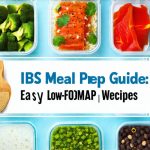Navigating weeknight dinners can feel like an impossible balancing act – striving for something quick, satisfying, and doesn’t leave you feeling bloated and uncomfortable. Many people experience digestive distress, ranging from mild discomfort to more significant issues, and food plays a huge role. Often, the culprit isn’t necessarily what we’re eating, but how it’s prepared or combined. A seemingly harmless meal can trigger symptoms if it’s high in difficult-to-digest fats, heavily spiced, or contains ingredients that personally disagree with your system. The good news is that creating meals that are both delicious and gentle on the stomach doesn’t require hours in the kitchen or a complete lifestyle overhaul. It’s about making informed choices and incorporating strategies to promote digestive health.
This article will explore simple weeknight dinner options designed to minimize bloating, gas, and general discomfort. We’ll focus on recipes utilizing easily digestible ingredients, gentle cooking methods, and mindful combinations. The aim is not to restrict but to empower you with the knowledge to create nourishing meals that support your well-being – allowing you to enjoy your food without anxiety or post-dinner regret. Understanding individual sensitivities is key; what works wonderfully for one person might cause issues for another. This guide provides a starting point, encouraging experimentation and adaptation to find what best suits your body. Perhaps exploring foods that calm the stomach could offer additional relief.
Gentle Cooking & Ingredient Choices
The foundation of a belly-calming dinner lies in how you prepare your food and the ingredients you select. Harsh cooking methods like deep frying or excessive oil use can overwhelm the digestive system. Similarly, certain foods are inherently more difficult to break down than others. Opting for gentler techniques and easily digestible options is crucial. Steaming, poaching, baking (rather than frying), and slow-cooking are all excellent choices. These methods preserve nutrients while minimizing stress on your gut.
When it comes to ingredients, prioritize whole foods over processed items. Fresh fruits and vegetables, lean proteins, and whole grains are generally easier to digest. Fermented foods like yogurt or kefir (if tolerated) can also be beneficial due to their probiotic content, promoting a healthy gut microbiome. Conversely, limit highly processed foods, excessive sugar, artificial sweeteners, and overly fatty meals. Pay attention to how different ingredients affect you personally; keeping a food diary can help identify triggers. Learning how to identify foods that calm your gut is also beneficial.
Consider the impact of fiber. While essential for overall health, too much fiber at once can cause bloating in some individuals. Introduce fiber gradually and ensure adequate hydration. Similarly, cruciferous vegetables (broccoli, cauliflower, cabbage) are incredibly nutritious but also known to produce gas in many people. Cooking them thoroughly or combining them with carminative herbs like fennel or ginger can help mitigate this effect. Ultimately, it’s about finding a balance that supports both your nutritional needs and digestive comfort. Understanding foods that restore pH balance is also important for optimal digestion.
Soothing Flavor Profiles & Combinations
Beyond individual ingredients, the way you combine flavors also influences digestion. Spicy foods, while enjoyable for some, can irritate sensitive stomachs. Similarly, large amounts of caffeine or alcohol can disrupt gut motility. Gentle flavor profiles – incorporating herbs like parsley, mint, dill, and ginger – are often better tolerated. These herbs not only add flavor but also possess properties that aid digestion.
Focus on building meals around easily digestible proteins such as fish (salmon, cod), poultry (chicken breast), or tofu. Red meat can be harder to digest for some, so consider limiting it or choosing leaner cuts. Pair these proteins with cooked vegetables and easily digestible carbohydrates like quinoa, rice, or sweet potato. Avoid combining large amounts of protein and complex carbohydrates in the same meal, as this can slow digestion.
Mindful food combinations are key. For example, pairing fruit with protein is generally better than eating fruit on its own, as the protein slows down sugar absorption. Likewise, avoiding dairy with iron-rich foods (like spinach) can improve iron absorption. Small, frequent meals are often easier to digest than large, infrequent ones, so consider portion control and spacing out your meals throughout the day. Be mindful of everyday foods that inflame the lower esophageal sphincter.
Quick Chicken & Veggie Stir-Fry
This recipe is a fantastic example of a belly-calming weeknight dinner. It’s quick, customizable, and utilizes gentle cooking methods.
- Cut chicken breast into bite-sized pieces and marinate in a tablespoon of soy sauce (low sodium), a teaspoon of grated ginger, and a clove of minced garlic for at least 15 minutes.
- Steam or stir-fry your favorite vegetables – carrots, zucchini, bell peppers, and broccoli florets all work well. Avoid overcooking them; slightly crisp-tender is ideal.
- Add the marinated chicken to the pan and cook until fully cooked through.
- Serve with a side of brown rice or quinoa.
This stir-fry avoids heavy sauces and frying, relying instead on fresh flavors and simple preparation. Ginger aids digestion, while lean chicken provides protein without being overly difficult to break down. You can easily substitute tofu for the chicken if you prefer a vegetarian option. Consider pairing this meal with low-acid sauces to enhance flavor without irritation.
Baked Salmon with Roasted Sweet Potato & Asparagus
Salmon is rich in omega-3 fatty acids, which have anti-inflammatory properties and are generally well-tolerated. This recipe focuses on simple baking and roasting techniques to minimize digestive stress.
- Preheat oven to 400°F (200°C).
- Cut sweet potato into cubes and toss with a tablespoon of olive oil, salt, and pepper. Roast for 20-25 minutes, flipping halfway through.
- Place salmon fillet on a baking sheet lined with parchment paper. Season with a sprinkle of dill, lemon juice, and a pinch of sea salt. Bake for 12-15 minutes, or until cooked through.
- Roast asparagus alongside the sweet potato during the last 10-12 minutes of cooking time.
This meal provides healthy fats from salmon, complex carbohydrates from sweet potato, and fiber-rich asparagus – all prepared in a gentle manner. The dill adds a soothing flavor profile while aiding digestion. Avoid adding excessive spices or sauces to keep it gut-friendly. Proper breathing techniques can also help; explore how breathing supports digestive calm.
Lemon Herb Chicken Soup
Soup is often considered one of the most easily digestible meals. This lemon herb chicken soup utilizes simple ingredients and a slow simmering process to create a comforting and nourishing dish.
- In a large pot, combine diced chicken breast with water or low-sodium chicken broth. Add chopped carrots, celery, and onion.
- Bring to a boil, then reduce heat and simmer for at least 30 minutes, or until the vegetables are tender.
- Add fresh herbs like parsley, thyme, and rosemary during the last 15 minutes of cooking time.
- Finish with a squeeze of lemon juice before serving.
This soup is light yet filling, providing hydration and essential nutrients. The slow simmering process breaks down the ingredients, making them easier to digest. Lemon aids digestion, while herbs add flavor without irritating sensitive stomachs. Avoid adding cream or excessive spices to keep it gut-friendly. Remember that common cold drinks can often exacerbate digestive issues.


















